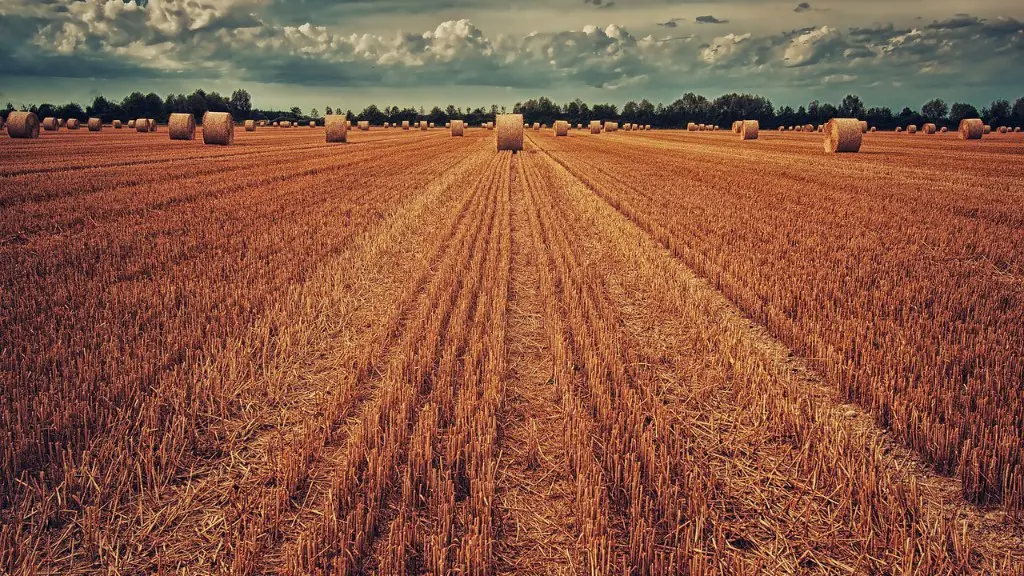Agricultural income is generally tax-free in the United States. This is because the government provides subsidies and tax breaks to farmers to encourage them to stay in business. The amount of agricultural income that is tax-free varies from year to year and from state to state.
There is no definitive answer to this question as it depends on individual circumstances. However, in general, agriculture income is considered tax-exempt if it meets the following criteria: it is generated from the farming or ranching of agricultural or horticultural products; it is derived from the grazing of livestock; and it is from the operation of afarm or ranch for the production of livestock, dairy products, poultry, fish, fruits, vegetables, nuts, berries, grains, or other agricultural or horticultural products.
What qualifies as a farm to the IRS?
A farm is a piece of land used to cultivate crops or rear animals for commercial purposes. Farming is an important part of the agricultural industry.
There are many different types of farms, including livestock, dairy, poultry, fish, fruit, and truck farms. Each type of farm has its own set of activities and purposes.
Livestock farms are used to raise animals for meat, milk, or other products. Dairy farms focus on producing milk and other dairy products. Poultry farms raise chickens, ducks, and other birds for their meat or eggs.
Fish farms raise fish for consumption or for sale to other businesses. Fruit farms grow fruits and vegetables for consumption or for sale. Truck farms raise crops that are used to produce food for livestock.
Plantations, ranches, ranges, and orchards are all types of farms that focus on the production of one specific crop. These farms are often much larger than other types of farms.
Most agricultural program payments are taxable and need to be reported on Schedule F (Form 1040). The payments will be reported to the recipient on Schedule 1099-G, Certain Government Payments.
Is farm income taxable
If you are engaged in a farming activity, you will need to file Schedule F (Form 1040) in order to report your income and expenses from the activity. You will then file this schedule along with Form 1040, 1040-SR, 1040-NR, 1041, or 1065. Depending on the state and local requirements, your farming activity may also subject you to state and local taxes as well as other requirements such as business licenses and fees.
California’s property tax break for agricultural land is a great way to encourage farmers to keep their land undeveloped. This helps to preserve the state’s agricultural industry and keep farmland available for future generations.
Is a hobby farm tax deductible?
If you turn your hobby into a business, you may be able to deduct your farm-related expenses, even if they go above your farm income. So if your farm operates at a loss, that loss can be used to offset your tax burden on your overall income.
Farming has always been a tough business, and the “five-year rule” is a testament to that. This rule states that a farmer must make a profit every six years, or else they risk going out of business. This is a tough standard to meet, but it’s one that farmers have to adhere to in order to stay afloat.
What is the 3 year rule for farm losses?
Where a farm makes losses for a number of years in succession, then losses are available for offset against other income for the first three years only. Special rules extend this period in the case where a farmer commences his/ her trade. No loss relief is available for hobby farming.
Taxes on agricultural income are imposed by the state governments in India. Farmers who have no other sources of income are not required to file income tax returns.
Why is agricultural income not taxed
As per the Income Tax Act, agricultural income is not taxable under Section 10 (1). However, if the agricultural income exceeds Rs 5,000 per year, the state government may levy a tax on it.
If a farmer’s income is less than Rs 5,000 or if the total income minus the agricultural income is less than the basic exemption limit, the income will be exempted from being taxed. This is a great relief for farmers as it will help them to increase their income and provide for their families.
Can you claim farm animals on your taxes?
You cannot claim farm animals, pets or animals of any kind as dependents. However, you can claim certain farm animals as farm tax deductions or business expenses.
The money you earn from working is considered earned income. This includes wages, salaries, tips, and self-employment income.
What makes a farm a farm
The USDA defines a farm as any place that produced and sold—or normally would have produced and sold—at least $1,000 of agricultural products during a given year. The USDA uses acres of crops and head of livestock to determine if a place with sales less than $1,000 could normally produce and sell at least that amount.
The minimum requirement for grazing stock is 4 animal units. An animal unit is defined as 1000 pounds of live animal weight. This means that the minimum requirement for grazing stock is 4000 pounds of live animal weight. This requirement is in place to ensure that the grazing stock will not overgraze the land.
How many acres do you need for ag exemption bees in Texas?
The State of Texas has set a minimum of 5 acres and a maximum of 20 acres to qualify beekeeping as an agriculture use. This is to ensure that beekeepers are able to provide a good environment for their bees and that the bees have enough space to forage.
There are two types of taxpayers – individual and Hindu undivided family (HUF). An individual can file ITR-1, ITR-2, ITR-3, ITR-4, ITR-5 and ITR-6. On the other hand, an HUF can file ITR-1, ITR-2, ITR-3 and ITR-5.
ITR-1, or Sahaj, is the simplest form and can be filed by an individual if his/her total income includes:
Income from salaries
Income from one house property
Income from other sources (excluding Lottery and Income from Race Horses)
However, ITR-1 cannot be filed if the individual has:
Income from more than one house property
Income from winnings from lottery or income from race horses
Income from capital gains
Agricultural income exceeding Rs 5,000
If the agricultural income exceeds Rs 5,000, the taxpayer will have to file ITR-2.
Conclusion
There is no definite answer to this question since tax laws vary from country to country. In general, though, most countries exempt a certain amount of agriculture income from taxes. This exemption is usually designed to encourage farmers and promote agricultural production.
The answer to this question depends on the specific country’s tax laws. However, in general, agriculture income is typically taxed at a lower rate than other types of income. This is because agriculture is considered to be a vital part of the economy, and thus, the government wants to encourage it.





